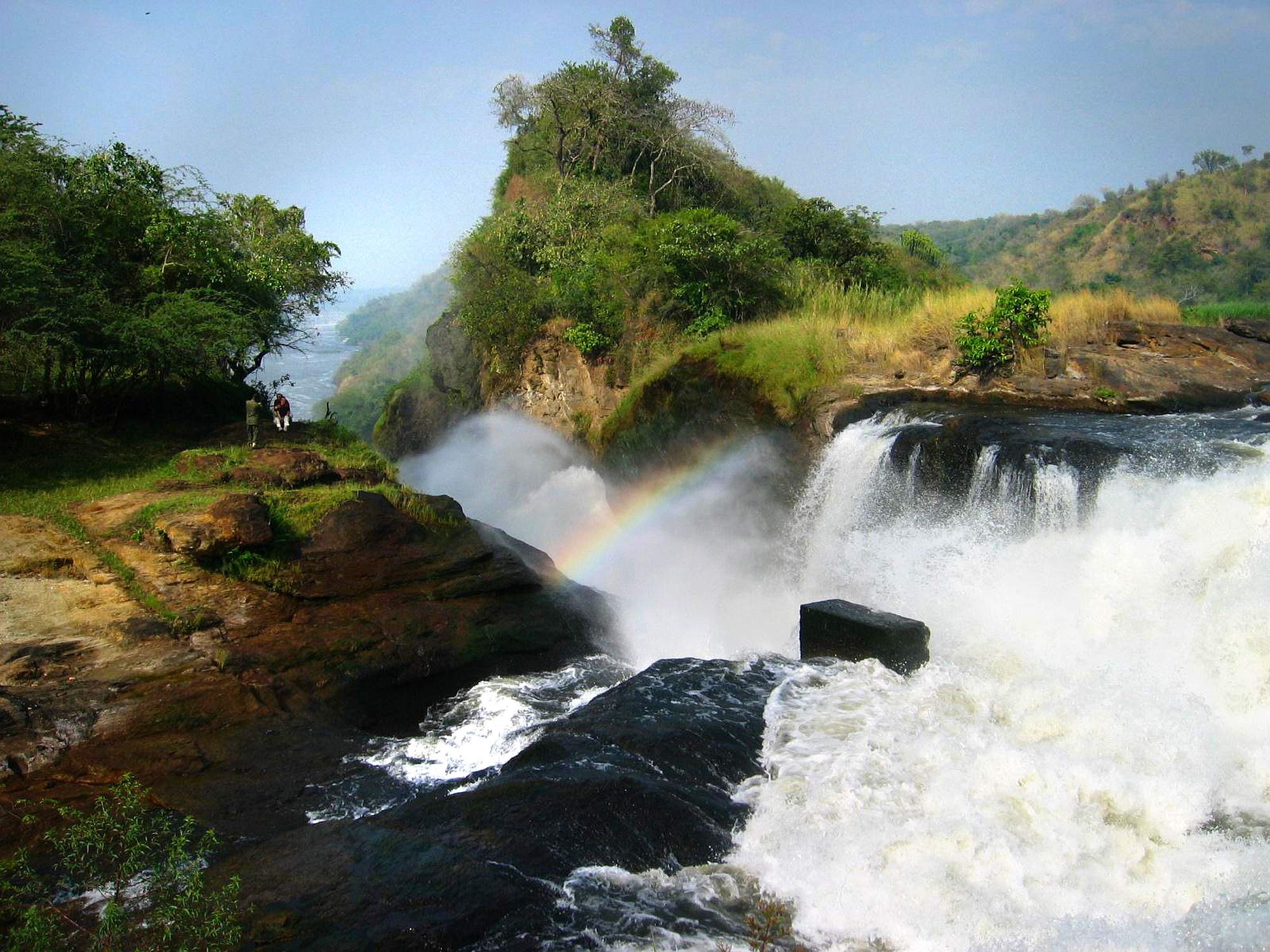
Every day, in Uganda, dozens of people disappear, killed in the streets or arrested without charge, and others remain on the ground, exhausted, after indiscriminate police attacks. Despite being a country with an ostensibly democratic parliament, for more than 60 years this country, which holds a key position in the political, economic and military chessboard of sub-Saharan Africa, has been in the hands of vicious dictatorships, and is torn apart by inter-ethnic and religious conflicts. The economy is growing, new infrastructure is being built, and Kampala is a key airport for international trade, especially the one connecting Asia to the region’s richest countries, such as the Democratic Republic of Congo and Angola. Perhaps because of this, every new day in Uganda is bathed in the blood of the innocent.
Yet, it only takes a moment to be thunderstruck by its beauty. Winston Churchill called it ‘the pearl of Africa’: lying on a plateau 1200 metres above sea level, it is surrounded by majestic mountains over 4000 metres high; it encompasses half of the immense Lake Victoria and is lapped by the Nile for thousands of kilometres of lush, wild and unspoilt nature. A land full of suffering, dominated for decades by bloodthirsty dictators like Milton Obote and Idi Amin Dada, and still in the grip of yet another monster, Yoweri Kaguta Museveni, and torn by inter-ethnic strife. Almost 46 million inhabitants[1], 75% of whom live in rural areas[2] and are engaged in agriculture. 28% live on less than USD 2 a day[3]: the number of poor is increasing, but the GDP has risen from USD 6 billion in 2000 to USD 36 billion in 2019[4] – and things will get worse, as it is estimated that the population will double between 2020 and 2060, to 104 million[5].
Christian colonisation
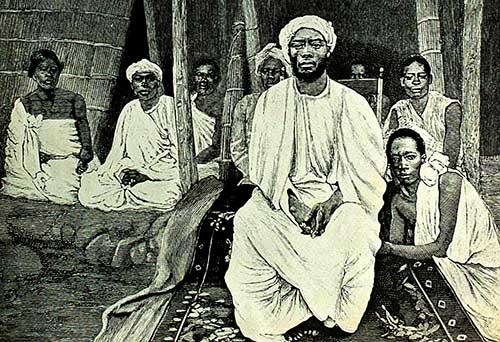
Mwanga II, the King who started the persecution of Christians[6]
In the 19th century, Uganda is divided into small kingdoms. Buganda, the largest and most powerful, is led by a monarch called Kabaka, maintains a large bureaucracy and a powerful army, and controls a vast territory from Lake Victoria to the Nile[7]. In 1862, the British explorer John Hanning Speke[8] was the first European to visit Buganda and meet the ruler Mutesa I. In 1875, Mutesa I is confronted with the arrival of Christian missionaries. Kabaka hopes they will help him militarily against the incursions of the Egyptians, but is disappointed[9]. By letting them in, the monarch takes in a group of troublemakers who, in their thirst for proselytism, ignite tribal wars everywhere[10].
Mutesa died in 1884, and was succeeded by his son Bassammula Ekkere Mwanga II, who was only 16 years old – and who was determined to solve the problem of the Christians[11]. Contrary to his father, who had tried to mediate, Mwanga expelled the missionaries and asked the converts to abandon their new faith, threatening them with death: a year after his accession to the throne, Mwanga executed the first three Christian martyrs and ordered the death of the Anglican bishop: it was only the beginning of a real slaughter[12]. This ferocity alarmed the British, who supported the ascension to the throne of his half-brother Kiweewa Nnyonyintono, who after a month abdicated in favour of another brother, Kalema Muguluma[13]. Mwanga negotiated with the British and returned to the throne in exchange for a treaty granting powers over revenue, trade and the administration of justice to the British Imperial East African Company[14].
In August 1894 Buganda became a British protectorate[15], so Mwanga, feeling betrayed, went to war: arrested and interned in Bukoba, he was deposed in absentia on 9 August 1897. Escaping from prison, he tried again with some rebels to return to power. Captured, he was exiled first to Somalia and then to the Seychelles Islands where he spent the rest of his life[16] in the Anglican Church[17]. His deportation leaves the British in control of what will later become Uganda, but the war of resistance leaves wounds that have not yet healed.
From Protectorate to dictatorship
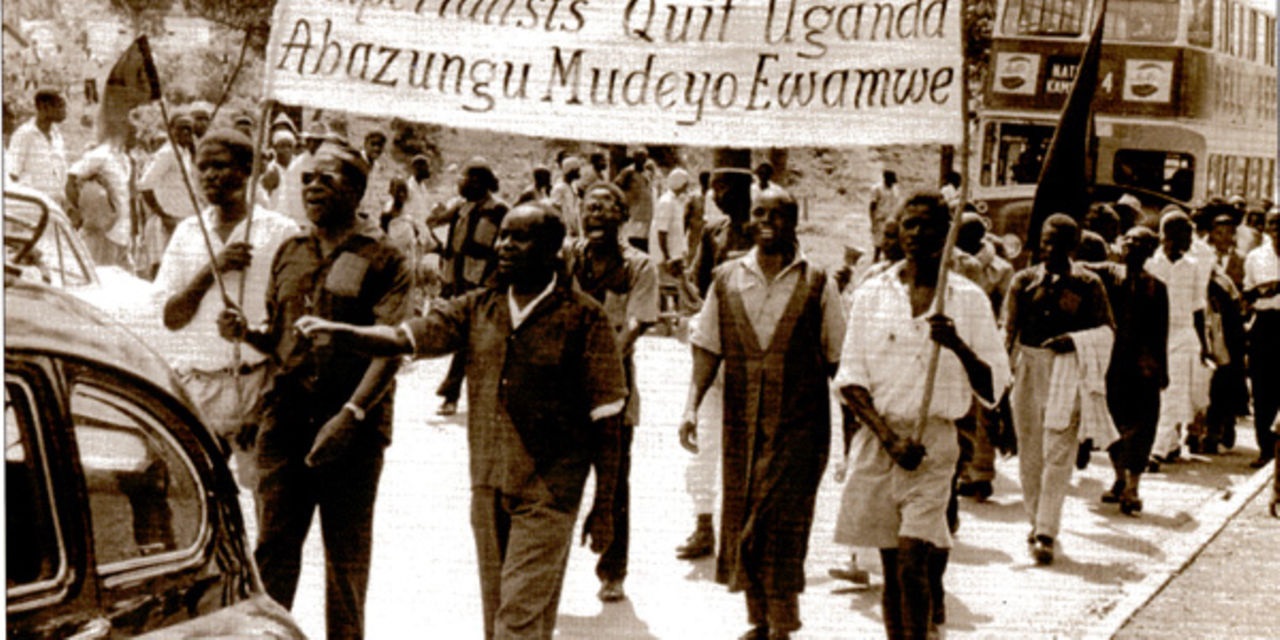
1956: Ugandans march in Kampala to demand independence from British colonialism[18]
In 1899, Sir Harry Johnston, colonial administrator, was commissioned to visit the country and make recommendations on the future administration. His mission resulted in the Buganda Agreement of 1900 (later amended in 1955 and again in 1961[19]), which laid the foundations of relations between Buganda and the British Crown[20]: the Kabaka is granted full authority over Buganda as long as he remains loyal to the protecting authority; power is also distributed to the minor chiefs, who are also granted a certain amount of land ownership. A de facto constitutional monarchy was born[21]. The British administration extends its rule north and east of the Nile. No agreements are made in these areas and British officers, often assisted by Buganda agents, rule themselves. By 1914 the borders of the new Uganda are fixed under British control[22].
The cultivation of cotton took a leading role in exports and, subsequently, the production of coffee and sugar also received a big boost. Unlike neighbouring countries, Uganda is not attractive to European settlers, and the protectorate itself encourages local agricultural development: production remains in the hands of smallholders and many Indians, Pakistanis and Goyans[23] attracted by the commercial opportunities. The First World War slowed down the economy, but expansion continued in terms of infrastructure, with the construction of the first railways[24]. The depression of the 1930s did not stop growth. This was also the case during the Second World War, which in fact created new opportunities for development[25].
After the end of the war, Buganda is in turmoil, the people want independence. In the elections of April 1962, Milton Obote, leader of the Uganda People’s Congress Party (UPC), is elected Prime Minister and proclaims independence on 9 October[26]. Obote replaced the British governor in a climate of deep political rifts. On 4 October 1963 the Kabake of Buganda, Mutesa II, becomes President and, a year later, breaks the alliance with Obote because of the unfavourable outcome of the referendum on counties[27].
Milton Obote prepared his revenge, and in March 1966 forced Mutesa II into exile in the United Kingdom, where he died three years later[28]. Once president, Obote tried to secure his power by passing a new constitution in 1967 that abolished the federal structure and replaced it with an executive presidency, and divided Buganda into four districts[29]. The new status drastically weakened the power of the traditional rulers, centring it in the hands of Obote (now simultaneously President and Prime Minister), and this, together with a general discontent over widespread corruption, fuelled popular anger[30].
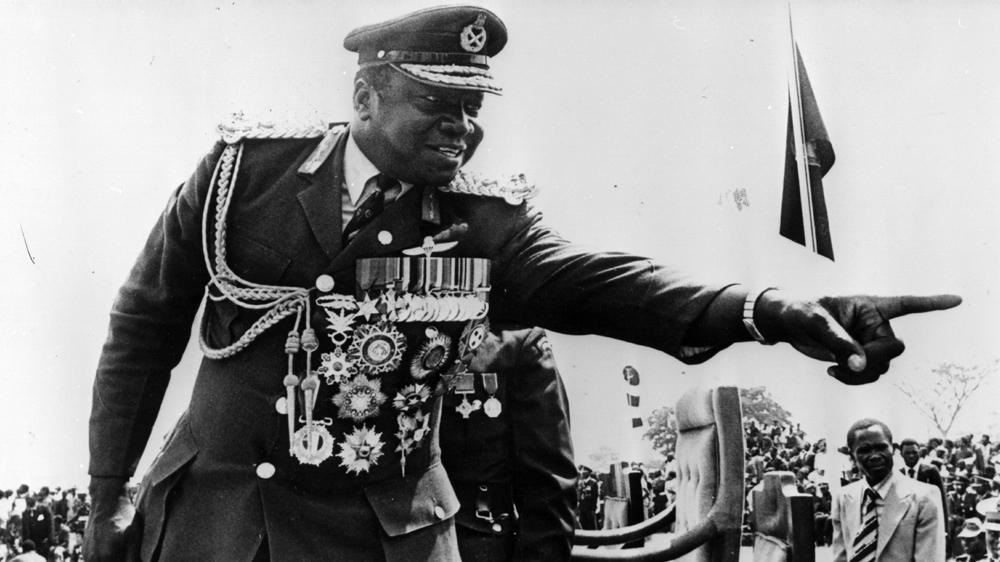
The ferocious dictator General Idi Amid Dada[31]
General Idi Amin, who had led the pro-Obote rebels, was forced to resign and was convicted on charges of misappropriation of public funds, and decided to take up arms against Obote[32]. On 3 February 1971, Amin’s troops captured the President and installed a military dictatorship[33]. In 1978 Uganda invaded Tanzania in an attempt to annex the Kagera region. Tanzania launched a counter-invasion in 1979, uniting several anti-Amin forces. The Ugandan army is defeated, the dictator flees the country, leaving behind a nation destroyed by eight years of terror[34]: the International Commission of Jurists in Geneva estimates that Amin had up to 300,000 people killed[35]; Amnesty International estimates half a million dead[36]: Amin goes down in history as a bloodthirsty madman[37]: he boasts of eating human flesh and keeping human heads in his refrigerator; he throws 4000 disabled people into the Nile along with many of his ministers to be dismembered by crocodiles[38]. Everyone enjoys himself as he knows how…
In 1980 the first democratic elections in 18 years take place, and Obote wins[39]. Claiming that the elections were rigged, the National Resistance Army, in which several rebel forces (including Yoweri Museveni’s Popular Resistance Army) converge, unleashes guerrilla warfare throughout the country and attacks former Amin supporters[40].. The war is bloody: over 200,000 Ugandans flee to Rwanda, Congo and Sudan[41]. Amnesty International estimates that the Obote regime has killed over 300,000 civilians[42]. On 27 July 1985, yet another military coup deposes Obote, and Lieutenant General Tito Okello becomes head of state[43]. The country is in chaos. Okello ousted Museveni, and he continued the war, culminating in 1986 with the conquest of Kampala: the country is now in Museveni’s hands, and after 36 years things have not changed[44].
Yoweri Kaguta Museveni, the eternal dictator
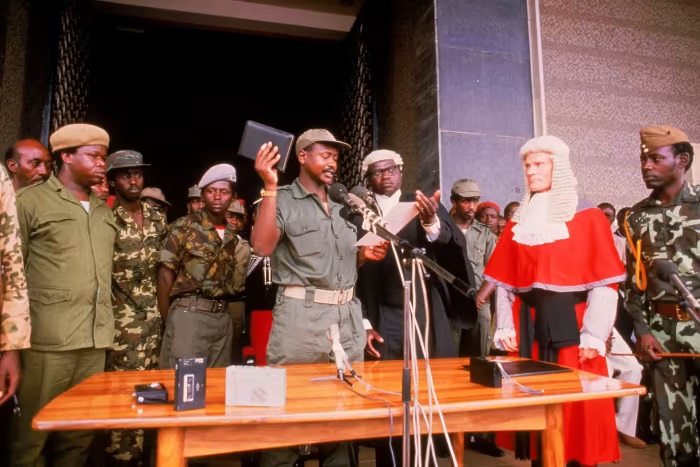
1 January 1986: Yoweri Museveni is sworn in as President of Uganda[45]
Born in 1944 in Ankole, in the south-western district of Ntungamo to a family of cattle breeders[46], Museveni attended university in Dar es Salaam, where he obtained a degree in economics and political science[47]. At university, he proclaimed himself a Marxist and a Pan-African. He then received guerrilla training in Mozambique. In 1970 he joined Uganda’s secret service, but fled to Tanzania when Idi Amin seized power in 1971[48]. There, in 1973, he founded the National Salvation Front (FRONASA) [49]. Five years later he supported Tanzania against the invading Ugandan troops, and on 11 April 1979 he succeeded, together with Tanzanian President Julius Nyerere, in overthrowing Idi Amin[50]. After seven years of civil war, he was sworn in on 29 November 1986, proclaiming a Government of National Unity[51] .
Museveni promises security and respect for human rights[52]. He has a broken country on his hands, with a shattered economy and two decades of atrocities behind it, not yet completely pacified. He cuts the costs of the civil service and the army, privatises the first state companies, sets up a Constitutional Commission to bring about deeper changes[53]. Despite the difficult conditions, Musaveni succeeds in improving things: opening up to the freedom of the press, combating corruption, fighting AIDS, mediating with opponents, improving infrastructure, are some of the choices that will put the country back on its feet. Museveni remains opposed to parliamentary democracy which, according to him, promotes inter-ethnic divisions and corruption: he therefore banned parties in 1995[54].
Amnesty International, in a human rights report published in March 1989[55] and examining Museveni’s first three years, while acknowledging a change of course from the atrocities committed by Obote and Amin, is not lenient towards the new President, accusing him of detaining alleged political opponents in northern Uganda without charge, sometimes for months on end, and of torturing and killing prisoners[56]. In the document, Amnesty urged the government to carry out reforms involving strict respect for human rights[57].
On 27 June 1996 Museveni won the elections with 74.2% of the vote[58]. There is no shortage of suspicions of fraud: the opposition candidate is constantly assaulted, the vote count often does not add up, but the contest is nevertheless validated[59]. After decades of ferocious dictatorships, Uganda finally seems to have turned over a new leaf, having experienced a decade of general recovery under Museveni, with an economy that will touch annual growth rates of 10%[60]. Until the President decides to go to war.
The war in the Congo
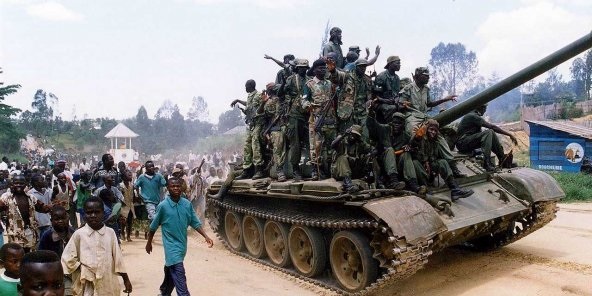
Ugandan troops in Bunia, DRC, return home after conflict involving nine African countries[61]
In 1997, Laurent-Désiré Kabila, a Congolese rebel leader, supported by Uganda and Rwanda, overthrew the Zairean president Mobutu Sese Seko[62]. In Kinshasa, the new president, who changed the nation’s name to Democratic Republic of Congo, relies on the force of foreign armies. During the night of 2 to 3 August 1998, Congolese Tutsi soldiers and some Rwandan soldiers still in the territory attempt to overthrow him. The next day, Uganda and Rwanda invade the western areas of the Congo River, bringing their troops from Goma, on the eastern border, to Kitona, on the Atlantic coast, with the intention of supporting the coup[63]. Kabila is skilful and, by obtaining the support of Namibia, Zimbabwe, Angola, Chad, Libya and Sudan, holds back the rebels’ advance[64].
On 18 January 1999, Rwanda, Uganda, Angola, Namibia and Zimbabwe agree to a truce in Windhoek, Namibia, without inviting the DRC[65], so that the fighting goes on until 16 January 2001, when Laurent-Désiré Kabila is killed in the presidential palace by a plot hatched by the kadogo, the ‘child soldiers’, who are disappointed with the president’s treatment of them[66]. The presidency goes to his son Joseph, who succeeds in stopping the conflicts: Uganda and Rwanda withdraw their troops, and for Museveni it is the beginning of serious diplomatic trouble: on 23 June 1999, the DRC files a petition against Burundi, Uganda and Rwanda at the International Court of Justice registry “for armed aggression […] in flagrant violation of the United Nations Charter and the Charter of the Organisation for African Unity”; Kinshasa asks for damages: 11 billion dollars[67].
In 2001, the UN investigates the illegal trade in diamonds, cobalt, coltan, gold and other Congolese resources, and determines that Rwanda, Uganda and Zimbabwe bear undeniable responsibility and recommends the Security Council to impose sanctions[68]. On 19 December 2005, the International Court of Justice ruled that Uganda had violated the principle of ‘non-intervention’ in the DRC and had violated human rights laws through the brutalities committed by its army. It concludes that Uganda ‘bears international responsibility for violations of international human rights law and international humanitarian law […] its forces have committed acts of killing, torture and other forms of inhuman treatment of the civilian population, destroyed villages and civilian buildings, incited ethnic conflict and been involved in the training of child soldiers’. Uganda ‘bears international responsibility for acts of looting and exploitation committed by its troops, including its highest ranking officers’[69].
The Court ordered the parties to come to an agreement, which, however, never came, and the DRC was forced to go back to court in 2015 to press for a settlement. It was not until 9 February 2022 that a new verdict came in: Kampala must pay the DRC USD 330 million for the violations found[70]. The sentence comes at a time when relations between Uganda and the DRC are improving, so it is not enforced[71]. But for Musaveni, it is not only the war in Congo that has occupied him disastrously for years: during his term in office he will also have to deal with the rebel group Lord’s Resistance Army (LRA), led by Joseph Kony.
LRA and government – an endless contest of atrocities
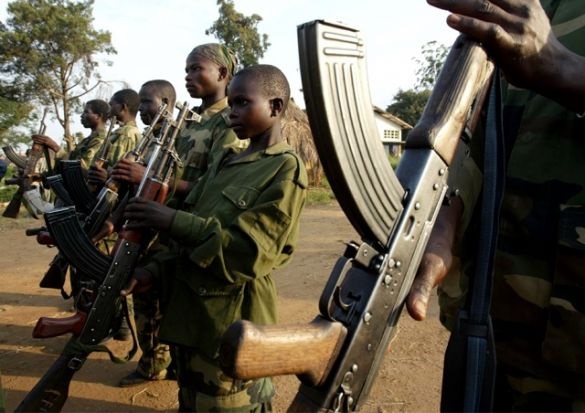
The Lord’s Resistance Army, in addition to its many cruelties, kidnapped 30,000 children for use as warriors in its army
LRA was born in 1988 in northern Uganda from the remnants of the Holy Spirit Movement army founded by Alice Auma Lakwena – a priestess who claimed to be a messenger of God, possessed by a spirit called Lakwena[72]. The rebel group has its roots in the conflict between the Acholi tribe of northern Uganda and the other tribes of southern Uganda, which began during the regime of Idi Amin Dada, although the fuse is in the colonial past[73]. The Acholi are despised by the British, their lack of cooperation alienates them from economic development, they are mostly used as labourers or conscripted into the colonial army. The hatred between the Acholi and the other tribes becomes unbridgeable and results in a fierce war[74].
In 1986, after Idi Amin (an Acholi) is overthrown and Museveni takes his place, the Acholi are forced to flee to the north. In response to the outrages suffered by the Acholi, Joseph Kony, a shaman, founded the LRA with the aim of overthrowing Museveni’s government. Initially it does not gather support due to brutal excesses and the absence of a political agenda. Kidnapping becomes the main means of recruitment: at least 67,000 young people, including 30,000 children, are captured for use as soldiers, sex partners and porters[75]. The LRA causes 1.6 million displaced persons, 90% of the population of the north, to be gathered in squalid camps where cholera, hunger, crime and violence prevail[76]. The government fights militarily and tries to mediate, but achieves nothing.
In 1994, Joseph Kony crossed the border to establish bases in Southern Sudan and the LRA intensified kidnappings, massacres and mutilations[77]. With Kony’s army united by fear of summary executions, there is a lack of political support for Kony’s aims. Nevertheless, the camps for displaced people are so inhuman that they further amplify the Acholis’ hatred for Museveni[78]. In March 2001, Museveni is re-elected with over 69% of the vote[79], but his victory appears inflated by numerous electoral frauds, assaults, violence and intimidation – even though international observers validate the election[80].
In 2002, the army in Kampala launched a massive military offensive against LRA bases in Southern Sudan, in agreement with the Sudanese National Islamic Front[81]. More death and destruction: in November 2003, Emergency Relief Coordinator Jan Egeland declares: ‘I cannot find anywhere else in the world that is experiencing an emergency on the scale of Uganda […]’[82]. In December 2003 Museveni denounced the LRA at the Hague Criminal Court for war crimes[83]. From 2004 onwards, the government army’s repressive circle advances and the LRA finally begins to lose its destructive power. On 8 July 2005, the International Criminal Court issues an arrest warrant against Joseph Kony for murder, enslavement, sexual enslavement, rape and other inhuman acts; he is also charged with 21 counts of war crimes: murder, cruel treatment of civilians, attack against the civilian population, pillage, rape and forced conscription of children[84].
In February 2006, Museveni won the elections, for the first time multi-party, thanks to a referendum the year before[85], obtaining 59% of the vote[86]. Despite these elections also being plagued by serious irregularities, Museveni continues to lose consensus. Joseph Kony, after 12 years, undertakes peace negotiations, which fail[87]. In 2007, the parties sign the Global Solution Agreement, which binds them to find a lasting solution to the conflict in Northern Uganda[88]. Kony, however, lays down a condition: the International Criminal Court must withdraw the war crimes charges against him, which of course the Court will never do[89]; so he does not show up at the signing ceremonies scheduled first in April and then in November 2008. Still a failure[90].
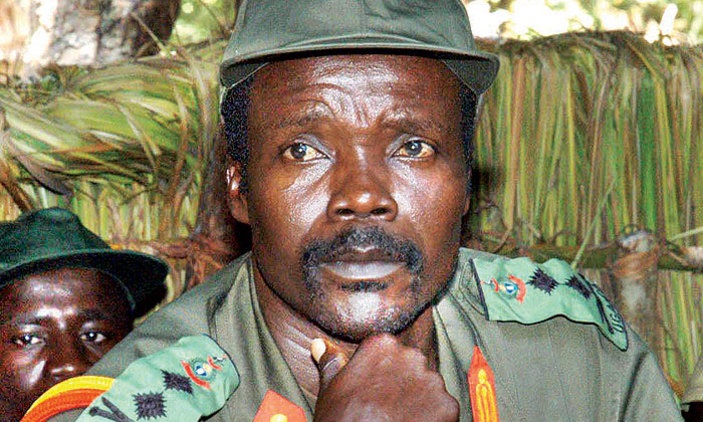
Joseph Kony, the LRA leader, is still at large[91]
Despite the LRA being dispersed in small, disorganised groups, ruthless attacks on civilians continue[92]. On 14 December 2008, a joint action is launched between Uganda, DRC and South Sudan, supported by the United States[93]. The operation turns out to be a disaster: it does not achieve any of the hoped-for objectives, but the negative effects are devastating[94]. The rebel leader is not captured, his army is scattered over an even larger area, and the retaliation is severe: killings and kidnappings increase, the situation in the camps worsens – hunger, disease and despair grow[95]. Since March 2009, the war has been continued by the Congolese army alone[96].
At the end of 2011, the United States deploys about 100 men in the Central African Republic, Congo, South Sudan and Uganda to arrest Kony, but is unsuccessful[97]; on 24 March 2012, the African Union sends a task force of 5000 to hunt for the LRA leader, but to no avail[98]. On 6 January 2014, Washington announces that it has captured one of the LRA commanders[99]; others were killed in battle[100], but no trace of Kony. The LRA now numbers no more than a thousand militiamen, and it is not certain whether Kony is still its leader[101]; it survives on poaching and the ivory trade[102]. In these long years, the LRA has left more than 100,000 people in the field, according to the UN, 100,000 children have been abducted and more than a million people have been displaced[103].
Museveni’s re-election in 2006 was followed by a fourth term (February 2011[104]), a fifth (May 2016[105]) and a sixth (May 2021[106]). During these years, the president strengthened his power by tightening anti-democratic laws, such as instituting life imprisonment for homosexuals or seven years imprisonment for those who officiate at their weddings[107]. Uganda is a country where lesbians are subjected to gang rape[108]… Musaveni refuses to investigate a very long series of killings and torture committed by his own officials; political imprisonment, killings of free demonstrators, intimidation[109] especially during elections seem to be the norm[110].
According to Human Right Watch, 2021 was the blackest year: during the election campaign, the government kidnapped, arrested and beat opposition supporters and journalists, killed protesters and disrupted popular demonstrations, suspended the internet for five days, blocked access to Twitter and YouTube for a month and Facebook for an indefinite period, restricted the right to freedom of movement and assembly, particularly for political leaders disliked by the government[111]. Museveni defends himself with misinformation, claiming that Uganda has been fighting for human rights for 60 years even though there is still ‘something to be done’[112].
The European Union does not believe in the president’s justifications at all, and is about to publicly condemn the continued torture and human rights violations, reporting what the Human Rights Commission reported during the Universal Periodic Review: that is, the persistence of serious violations of fundamental human rights, with ‘a significant increase in reports of torture, arbitrary arrests, enforced disappearances, harassment and attacks against human rights defenders, members of the opposition and environmental rights activists’. The report closes with a recommendation for an investigation into the abuses[113]. The Amnesty International Report also confirms the allegations[114].
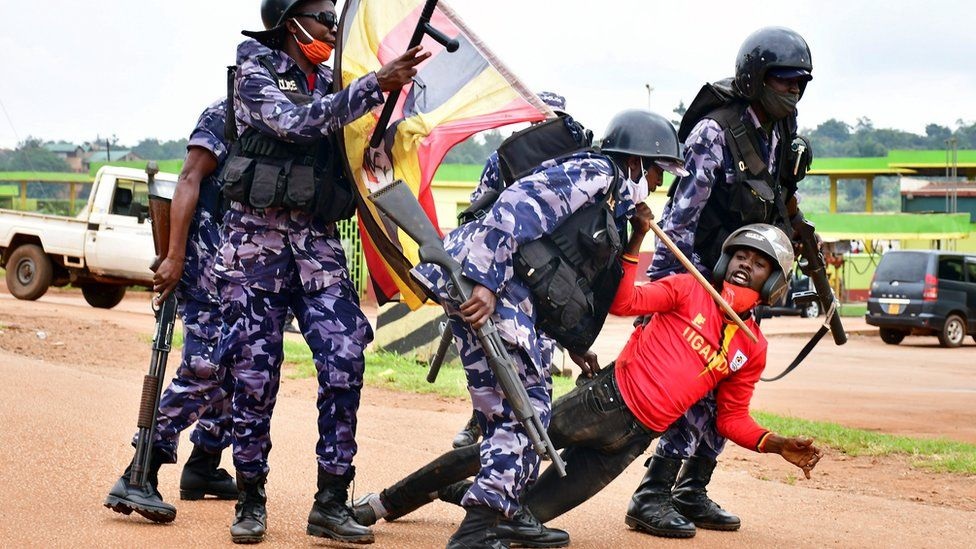
The army intervenes to beat up journalists and opponents of the regime[115]
What Museveni is trying to do, however, is simply hold on to power even after his own departure, pulling out the last ace up his sleeve: on 8 March this year, in a tweet sent out by his son, Lieutenant General Muhoozi Kainerugaba, we read of his decision to leave the army to run for president in his father’s place[116]. Since then, the protests have increased, and above all, the reports of disappearances, torture, rape and killings have increased. Without wishing to take moralism for granted, it is extraordinary the capacity of mankind to destroy everything it can, and to destroy itself and all its fellow human beings. Living in a paradise is not only not enough, but seems to be an incitement to further violence.
The international community, again, stands idly by, at least until there is a specific interest to intervene. The new trade route, which passes through Ethiopia, Eritrea and Kenya and reaches the logistical distribution centre for the whole of southern and sub-Saharan Africa in Kampala, could perhaps create a force to change all this. The risk is that, instead of tribal violence, the violence of Chinese rule will also arrive in Uganda. The only hope is that, on the way to the Congo River, the union of African countries will be able to find its own humane and efficient solution.
[1] https://data.worldbank.org/country/uganda
[2] https://blogs.worldbank.org/africacan/demographic-boom-explainer-ugandas-population-trends
[3] https://devinit.org/resources/poverty-uganda-national-and-regional-data-and-trends/
[4] https://borgenproject.org/impact-of-covid-19-on-poverty-in-uganda/ ; https://theconversation.com/uganda-needs-a-mind-shift-to-address-poor-growth-and-persistent-inequality-169469 ; https://devinit.org/resources/poverty-uganda-national-and-regional-data-and-trends/
[5] https://blogs.worldbank.org/africacan/demographic-boom-explainer-ugandas-population-trends
[6] https://ushypocrisy.com/2014/05/08/mwanga-ii-basammula-ekkere-the-king-of-bugandas-distorted-legacy/
[7] https://www.buganda.or.ug/about
[8] https://www.infoplease.com/encyclopedia/people/history/explore-conquer/speke-john-hanning
[9] https://nilepost.co.ug/2019/10/09/kabaka-mwanga-fooled-twice-to-hand-over-independence-conquered-thrice/
[10] https://dacb.org/histories/uganda-history-christianity/
[11] http://www.buganda.com/martyrs.htm
[12] http://www.buganda.com/martyrs.htm
[13] https://peoplepill.com/people/kalema-of-buganda
[14] https://nilepost.co.ug/2019/10/09/kabaka-mwanga-fooled-twice-to-hand-over-independence-conquered-thrice/
[15] https://nilepost.co.ug/2019/10/09/kabaka-mwanga-fooled-twice-to-hand-over-independence-conquered-thrice/
[16] https://nilepost.co.ug/2019/10/20/mwanga-and-kabalega-arrested-deported-to-somalia/
[17] https://beenhere.org/2017/10/18/danieri-basammula-ekkere-mwanga-ii-mukasa/
[18] https://www.monitor.co.ug/uganda/news/national/behind-the-struggle-for-uganda-s-independence-1852264
[19] https://urbech.net/articles-of-the-1900-buganda-agreement/
[20] https://urbech.net/articles-of-the-1900-buganda-agreement/
[21] https://urbech.net/articles-of-the-1900-buganda-agreement/
[22] https://urbech.net/articles-of-the-1900-buganda-agreement/
[23] https://www.joaoroqueliteraryjournal.com/nonfiction-1/2019/10/6/tina-athaide-forgotten-histories-of-uganda-goans
[24] https://en.unesco.org/courier/news-views-online/first-world-war-and-its-consequences-africa
[25] https://www.monitor.co.ug/uganda/magazines/people-power/how-world-war-ii-changed-uganda-political-social-scenes-1924630
[26] https://www.britannica.com/place/Uganda/The-Republic-of-Uganda
[27] https://www.monitor.co.ug/uganda/news/national/the-referendum-on-the-lost-counties-1522748
[28] https://www.newworldencyclopedia.org/entry/Milton_Obote
[29] https://www.hrw.org/reports/1999/uganda/Uganweb-06.htm
[30] https://www.blackpast.org/global-african-history/milton-obote-1925-2005/
[31] https://spazio70.com/societa-e-cultura/facce-da-anni-settanta/le-manie-britanniche-di-un-ex-sergente-dei-fucilieri-ritratto-di-idi-amin/
[32] https://origins.osu.edu/milestones/idi-amins-uganda-coup-1971?language_content_entity=en
[33] https://www.theguardian.com/world/2021/feb/03/general-idi-amin-takes-over-supreme-power-in-uganda-1971
[34] https://www.worldvision.org/disaster-relief-news-stories/uganda-genocide-nightmare-finally-end
[35] https://www.monitor.co.ug/uganda/special-reports/uganda-50/how-many-people-did-amin-really-kill–1526590
[36] https://www.monitor.co.ug/uganda/special-reports/uganda-50/how-many-people-did-amin-really-kill–1526590
[37] https://economictimes.indiatimes.com/people/10-most-ruthless-leaders-of-all-time/slideshow/52120630.cms
[38] https://www.adamsmith.org/blog/when-idi-amin-expelled-50000-asians-from-uganda
[39] https://www.nytimes.com/1980/12/14/archives/obote-party-wins-uganda-vote-giving-him-2d-term-as-president.html
[40] https://sites.tufts.edu/atrocityendings/2015/08/07/uganda-idi-amin-milton-obote-and-the-national-resistance-movement/
[41] https://sites.tufts.edu/atrocityendings/2015/08/07/uganda-idi-amin-milton-obote-and-the-national-resistance-movement/
[42] https://pretoria.mofa.go.ug/data-smenu-2-HISTORY-AND-POLITICAL-SITUATION.html
[43] https://www.washingtonpost.com/archive/politics/1985/07/30/new-leader-sworn-in-in-uganda/70483afc-adc3-4285-98ec-aadad3d7c40d/
[44] https://pretoria.mofa.go.ug/data-smenu-2-HISTORY-AND-POLITICAL-SITUATION.html
[45] https://www.ft.com/content/2db5ff63-a007-40ea-8426-0fbfd34fc095
[46] https://www.bbc.com/news/world-africa-12421747
[47] https://www.blackpast.org/global-african-history/people-global-african-history/yoweri-kaguta-museveni-1944/
[48] https://www.thenewhumanitarian.org/report/58146/uganda-profile-yoweri-kaguta-museveni
[49] https://www.thenewhumanitarian.org/report/58146/uganda-profile-yoweri-kaguta-museveni
[50] https://www.history.com/this-day-in-history/idi-amin-overthrown
[51] https://www.nytimes.com/1986/01/30/world/rebel-sworn-in-as-uganda-president.html
[52] https://journals.openedition.org/eastafrica/578
[53] https://journals.openedition.org/eastafrica/578
[54] https://www.lse.ac.uk/international-development/Assets/Documents/PDFs/csrc-working-papers-phase-one/wp73-museveni-and-no-party-democracy-in-uganda.pdf Crisis States Research Centre: “‘Populism’ Visits Africa: The Case Of Yoweri Museveni And No-Party Democracy In Uganda” – Giovanni Carboni – Università Degli Studi Di Milano – 2005
[55] https://www.amnesty.org/en/documents/afr59/001/1989/en/
[56] https://www.amnesty.org/en/documents/afr59/001/1989/en/
[57] https://www.amnesty.org/en/documents/afr59/001/1989/en/
[58] https://www.monitor.co.ug/uganda/special-reports/elections/how-free-and-fair-was-the-1996-election–1638638
[59] https://observer.ug/specials/museveni-rivals/59116-museveni-1996-poll-3-tricks-brought-victory
[60] https://www.researchgate.net/publication/242387023_Is_Uganda_an_emerging_economy_A_report_for_the_OECD_project_Emerging_Africa
[61] https://www.jeuneafrique.com/1310506/politique/rdc-louganda-condamne-a-verser-325-millions-de-dollars-a-kinshasa/
[62] https://www.britannica.com/biography/Laurent-Kabila
[63] https://casebook.icrc.org/case-study/icj-democratic-republic-congouganda-armed-activities-territory-congo
[64] https://casebook.icrc.org/case-study/icj-democratic-republic-congouganda-armed-activities-territory-congo
[65] https://www.thenewhumanitarian.org/news/1999/01/18-1
[66] https://www.theguardian.com/world/2001/feb/11/theobserver
[67] https://www.icj-cij.org/en/case/116
[68] https://reliefweb.int/report/democratic-republic-congo/report-panel-experts-illegal-exploitation-natural-resources-and
[69] https://www.icj-cij.org/public/files/case-related/116/116-20051219-JUD-01-00-EN.pdf
[70] https://www.icj-cij.org/public/files/case-related/116/116-20220209-JUD-01-00-EN.pdf
[71] https://jfjustice.net/why-uganda-is-not-happy-to-pay-less-in-dispute-with-drc/
[72] https://www.aljazeera.com/news/2014/5/6/profile-the-lords-resistance-army-2
[73] https://www.britannica.com/topic/Lords-Resistance-Army
[74] https://www.britannica.com/topic/Lords-Resistance-Army
[75] https://enoughproject.org/conflicts/lra
[76] https://www.smithsonianmag.com/history/uganda-the-horror-85439313/
[77] https://www.accord.org.za/publication/the-never-ending-pursuit-of-the-lord-s-resistance-army/
[78] https://invisiblechildren.com/challenge/history/
[79] https://journals.openedition.org/eastafrica/582?lang=en#tocto2n4
[80] https://www.theguardian.com/world/2001/mar/14/2
[81] https://www.accord.org.za/publication/the-never-ending-pursuit-of-the-lord-s-resistance-army/
[82] https://www.smithsonianmag.com/history/uganda-the-horror-85439313/
[83] https://www.icc-cpi.int/news/icc-president-uganda-refers-situation-concerning-lords-resistance-army-lra-icc
[84] https://www.icc-cpi.int/uganda/kony
[85] https://www.cambridge.org/core/journals/government-and-opposition/article/abs/reintroducing-a-locallevel-multiparty-system-in-uganda-why-be-in-opposition/9AE68DCF2D8024D0CB22B4CE5790DE68
[86] https://www.theguardian.com/world/2005/nov/25/uganda.mainsection
[87] https://www.britannica.com/biography/Joseph-Kony ; https://ploughshares.ca/pl_armedconflict/uganda-1987-2010/
[88] https://reliefweb.int/report/uganda/uganda-government-lra-agree-address-root-causes-conflict
[89] https://iecah.org/uganda-konys-concern-for-personal-safety-undermines-whole-peace-process/
[90] https://reliefweb.int/report/central-african-republic/after-operation-lightning-thunder-protecting-communities-and
[91] https://nehandaradio.com/2017/04/20/uganda-ends-hunt-lra-leader-joseph-kony/
[92] https://enoughproject.org/reports/finishing-fight-against-lra-strategy-paper
[93] https://fpif.org/africoms_ugandan_blunder/
[94] https://fpif.org/africoms_ugandan_blunder/
[95] https://rc-services-assets.s3.eu-west-1.amazonaws.com/s3fs-public/AfterOperationLightningThunder_200904_ENG.pdf “After Operation Lightning Thunder” – Mareike Schomerus and Kennedy Tumutegyereize – 2009
[96] https://rc-services-assets.s3.eu-west-1.amazonaws.com/s3fs-public/AfterOperationLightningThunder_200904_ENG.pdf “After Operation Lightning Thunder” – Mareike Schomerus and Kennedy Tumutegyereize – 2009
[97] https://enoughproject.org/blog/central-african-republic-refuge-lords-resistance-army
[98] https://enoughproject.org/blog/central-african-republic-refuge-lords-resistance-army
[99] https://theconversation.com/dominic-ongwen-surrenders-but-justice-for-lords-resistance-army-victims-will-be-hard-to-find-35966
[100] https://theconversation.com/ugandan-rebel-joseph-kony-the-latest-us-arrest-bid-raises-questions-177578
[101] https://www.dw.com/en/uganda-lord-resistance-army-final-days/a-60535944.
[102] https://www.cfr.org/blog/lords-resistance-army-and-elephant-poaching
[103] https://www.dw.com/en/uganda-lord-resistance-army-final-days/a-60535944
[104] https://www.reuters.com/article/us-uganda-election-idUSTRE71J0EV20110220
[105] https://www.aa.com.tr/en/politics/museveni-sworn-in-as-ugandas-president-for-fifth-term/571285
[106] https://www.voanews.com/a/africa_ugandas-museveni-sworn-sixth-term/6205749.html
[107] https://www.france24.com/en/20131221-uganda-new-anti-homosexuality-bill-life-prison
[108] https://www.france24.com/en/20131221-uganda-new-anti-homosexuality-bill-life-prison
[109] https://www.ilo.org/dyn/travail/docs/1836/Human%20Rights%20Report%20Uganda.pdf
[110] https://www.state.gov/wp-content/uploads/2021/03/UGANDA-2020-HUMAN-RIGHTS-REPORT.pdf
[111] https://www.hrw.org/world-report/2022/country-chapters/uganda
[112] https://www.mofa.go.ug/data/dnews/793/President%20defends%20Uganda’s%20Human%20rights%20record,
[113] https://sudantribune.com/article254981/
[114] https://www.amnesty.org/en/location/africa/east-africa-the-horn-and-great-lakes/uganda/report-uganda/
[115] https://www.mediadefence.org/news/hrnj-uganda-challenging-violence-against-journalists/
[116] https://www.lemonde.fr/en/international/article/2022/04/19/uganda-s-general-twitter-lays-groundwork-to-succeed-his-father-as-president_5980955_4.html
Leave a Reply